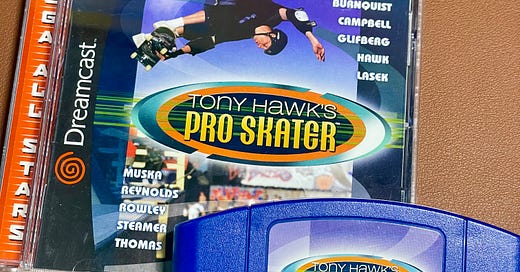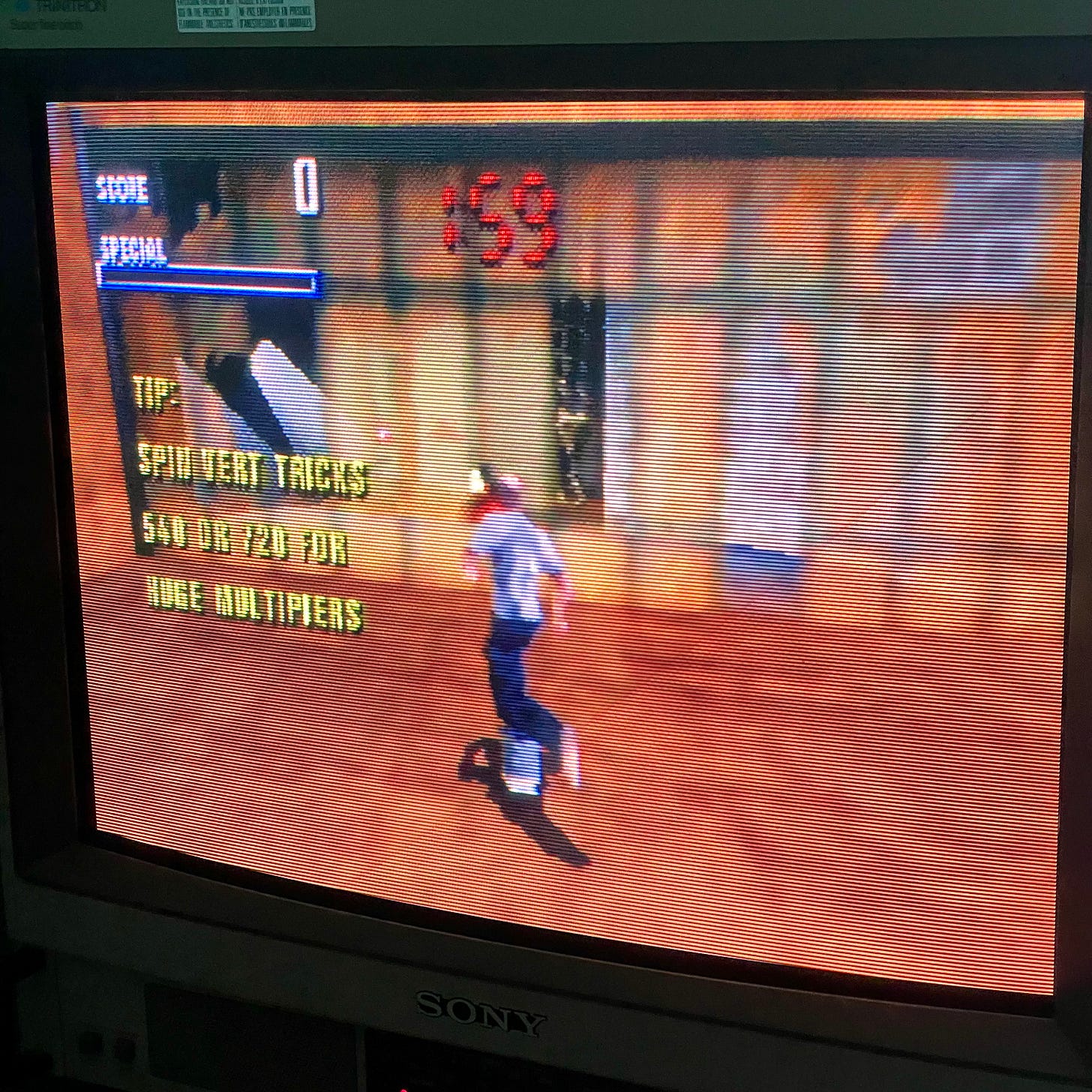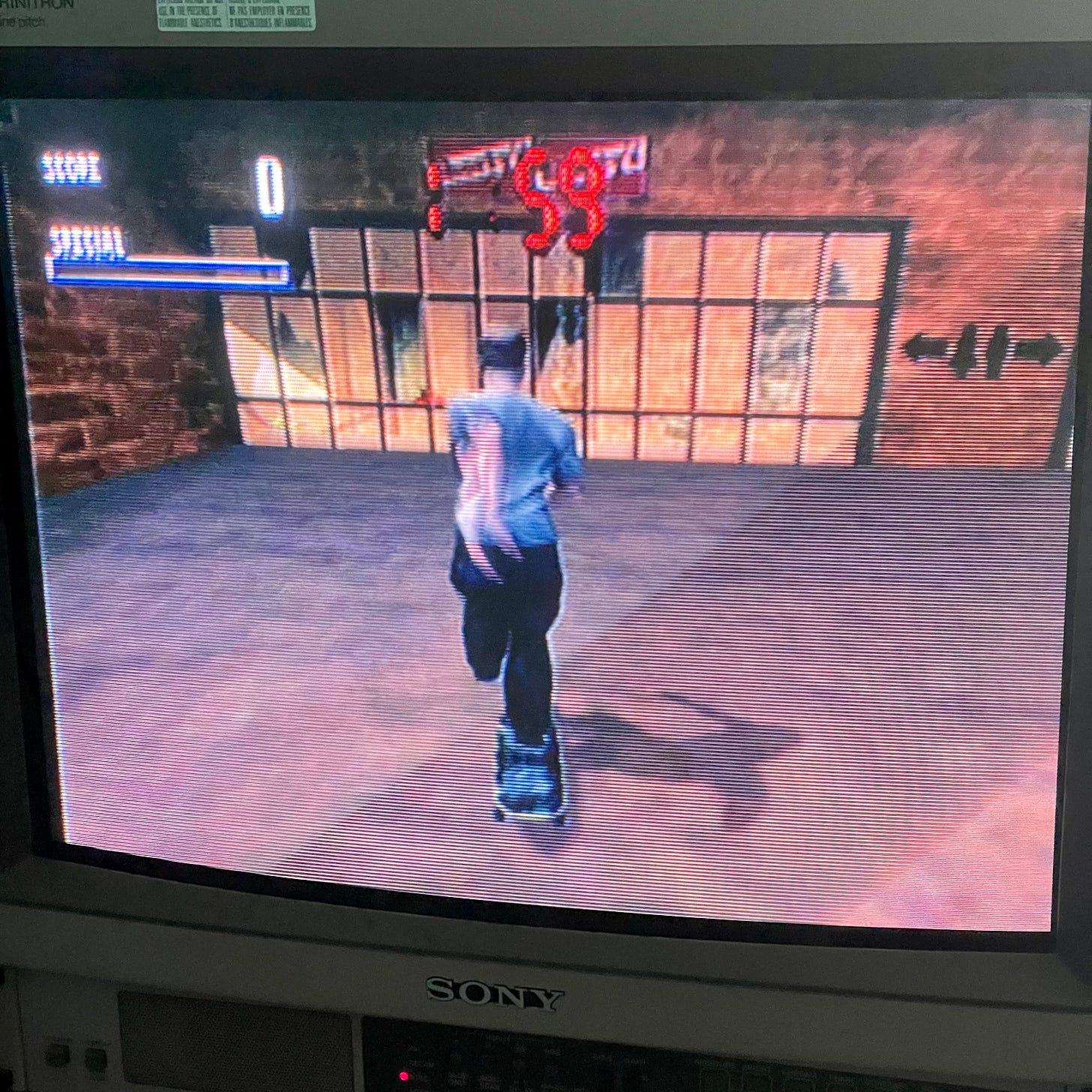No game series captured my attention like Tony Hawk’s Pro Skater. I was immediately addicted to the two-minute gameplay loop of setting high scores and accomplishing the level goals. Although I was never coordinated enough to pull off the tricks my character could easily pull off (much less stand on a skateboard without falling off), I could pretend I was a skater by playing the game. Instead of a lonely pre-teen reading Harry Potter books on the floor of my room, I was briefly Kareem Campbell or Chad Muska pulling off a Heelflip followed by a Tailgrab while rotating 900 degrees off a half-pipe.
From 2000 until about 2004, the Tony Hawk games greatly impacted my identity. When August rolled around and it was time to pick out new clothing for the upcoming school year, I chose clothing brands that the characters in Pro Skater represented. I wore baggy t-shirts, cargo shorts, and skateboard shoes to school. The soundtrack introduced me to new styles of music, new bands, and songs that I wouldn’t have found anywhere else in my life at that point. To this day, I still put on the soundtracks to the early games as pump-up music while I exercise.
Tony Hawk’s Pro Skater was released in 1999, developed by Neversoft, and produced by Activision. The game was first released on the Sony PlayStation, then the Nintendo 64, and finally, the Sega Dreamcast. The game received universal acclaim from critics and journalists when it was released and is still ranked among the best games of its time. The original game spawned 17 follow-up games, dozens of ports to handheld systems, and a few remakes. The series was at its peak under developer Neversoft, who handled the Tony Hawk license until 2007. Quality quickly eroded as Neversoft moved on to other projects, and Activision became more concerned with the quantity of Tony Hawk games rather than quality. Still, going back to the early games in the series is always a treat, and the gameplay still holds up remarkably well in the year 2023.
Tony Hawk was one of the most famous skateboarders of the 1980s and 1990s. He worked closely with Activision to consult on a game that captured the fun and excitement of skateboarding. Previous skateboarding games such as Skate or Die and California Games on the NES or 2xtreme on the PlayStation had failed to generate any enthusiasm for the sport in the digital world. Activision tasked Neversoft to develop a skateboarding simulation game for sale before the 1999 Christmas holiday. Neversoft prioritized fun and excitement over realism when designing the levels, gameplay, and physics engine. Once Neversoft had a working prototype, they contacted Tony Hawk, who was impressed by the gameplay enough to lend his name to the project. He was personally involved in the game's development, offering suggestions to the team on gameplay and which other top skaters to feature.
While the game was nearing its final development sprint, Tony Hawk participated in the 1999 X games. During that summer’s X-games, he made history by landing the world’s first-ever 900, a difficult trick that incorporates two and a half rotations in the air. The 900 was widely reported in the media and probably a god-send to Activision’s marketing staff, who subsequently told Neversoft to alter the nearly complete game code to add the 900 as a unique trick for Tony to pull off in the game. A demo of the game was included in the Jampack Summer ’99 demo disc that shipped with the PlayStation Underground magazine. The massive success of the PlayStation version prompted Activision to port the game to the Nintendo 64 and the Dreamcast, and handheld versions were quickly produced for the Gameboy Color and the Nokia N-Gage.
The game allows players to skateboard around open-ended levels while performing tricks and completing challenges. You will have to skate through a warehouse, a school, a mall, a few downtown areas, competition levels, and the final secret level, Area 52. Players have two minutes to set a high score and accomplish various goals, such as collecting the S-K-A-T-E letters, finding a secret tape, and other level-specific goals. Each new level asks more of the player with increased high-score requirements, complex obstacles, and some tough platforming challenges. Completing every challenge is relatively easy; however, it can often take several sessions on each level. The game is nearly infinitely re-playable as you can continue to set new high scores on each level.
The game’s sound design is nearly perfect. The sound of skateboard wheels on the pavement and the thuds when you fail to stick the landing never sound stale, no matter how long you have been playing. As mentioned above, the soundtrack is instantly recognizable and features music by Primus, Goldfinger, the Dead Kennedys, Suicide Machines, and a great mix of other 90s punk, ska, and alternative rock. On the PlayStation and the Dreamcast, the songs are wholly contained on the discs and are presented in full quality while playing the game. On the N64, to fit on the cartridge, songs are severely compressed, shortened, and some are even missing entirely.
Every game version has minor differences; some are better than others. The PlayStation version was the first to release and has two significant problems impacting the game's enjoyment today. The PlayStation version has very long load times between every level and a bad case of texture warp. The N64 version has no load times and stable textures but has noticeably poorer audio quality, lower quality textures, and a short draw distance. The Dreamcast version is probably the best, with high-quality audio, better graphics, and an auto-save feature lacking from the PS1 and N64 versions. I highly recommend playing the game on either the PS1 or the Dreamcast and avoiding the N64 version if you have the option. The game is still outstanding as an N64 title, that is how I first experienced it, but there are better options.
Another better option is playing the game on the Tony Hawk’s Pro Skater 1 + 2 collection, available on Xbox One/Series X, PlayStation 4/5, Nintendo Switch, and PC. It is a full remaster of all the levels in the first two games in the series, and it is incredible. The remaster features gameplay improvements that have been introduced since the original game, which makes the gameplay smoother and allows for longer trick combos. The graphics and visual updates look amazing and complement the original designs that Neversoft implemented into the original. The soundtrack incorporates everything that made the original great and even featured some new songs that fit perfectly with the original soundtrack. The remake was released in 2020 and can often be found on sale or used for a very reasonable price.
Tony Hawk’s Pro Skater is one of the most outstanding gaming achievements of the 1990s, and it's delightful to play, no matter how you choose to do so. The original games were a major factor influencing the culture of the late 90s and early 2000s, and I doubt there are many people my age who have never skated even a single session of one of the Tony Hawk games. The game's quick pick-up and play nature uniquely lends itself to playing with your friends or solo. The addictive nature of chasing a new high score will keep you hooked for a long time. The success of the recent remasters gives me a lot of hope that Activision will return to producing high-quality, fun games with the Tony Hawk license.






